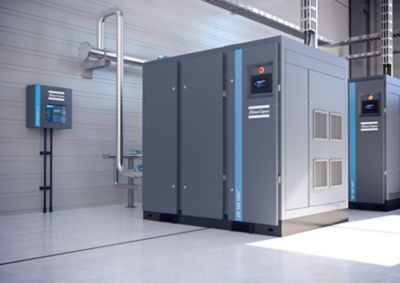Estimated reading time: 3 minutes
Air compressors are the hidden forces behind almost every production of a company. Whether food packaging, CNC machining, wastewater treatment or any other application, compressed air is needed everywhere. Compressors play an essential role in ensuring that your production runs safely and without problems and continues. But what if your compressed air station fails unexpectedly?
The simplest answer: Activate your contingency plan, which should include switching to a backup, standby, or redundant compressor. This allows you to ensure that your production continues until your main unit can be repaired. Below you will learn more about the different types of compressors and their importance for your business.
What is a backup compressor and why do I need one?
A backup compressor or reserve compressor is just that: a machine that serves as a reserve for your existing compressor. It serves as a safety net and is ready to use immediately if your existing compressor fails. It is better to act with foresight and have a second compressor ready for such cases than to suddenly stand with a defective compressor and thus jeopardize a production standstill.
What is a standby compressor and why do I need one?
A standby compressor is comparable to a backup compressor, but unlike the latter, it doesn't just stand around in your plant as an insurance policy. Instead, a standby compressor is connected to your compressed air system and also turns on when there is an increased production demand, i.e. Not only is the failure of a compressor intercepted, but also peak demand with increased production can be bridged effortlessly.
What is a redundant compressor and when do I need one?
Redundancy in compressors is quite simple: two (or more) compressors work in parallel and take turns to meet demand – but each of the two compressors is able to cover all the need for compressed air on its own. This means that if one of the units fails, the second unit takes over all the demand and production continues.
The advantages are obvious:
- no downtime
- no impact on profit, and
- no spoiled products
This is also an advantage when planning maintenance work, as maintenance can be carried out at any time - so you no longer have to plan and carry out maintenance after work, on weekends or holidays. Also, the production does not have to be stopped and can continue to run.
So now you have to decide:
Can your company afford the impact in the event of a compressor failure? In most cases, the answer is no. That's why it's so important to implement the above options! At least one of the three options described above is certainly the ideal solution for your company.

